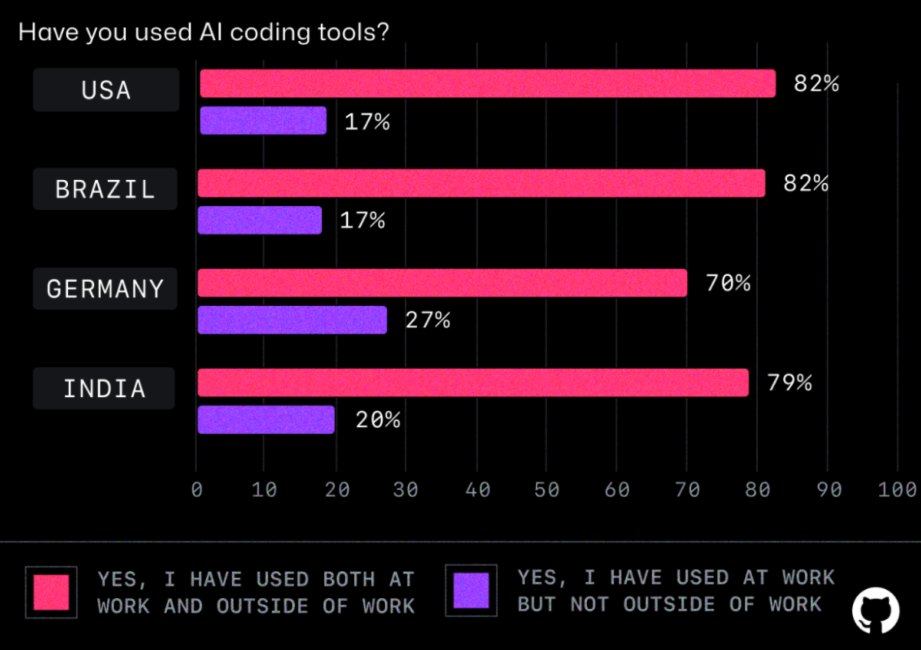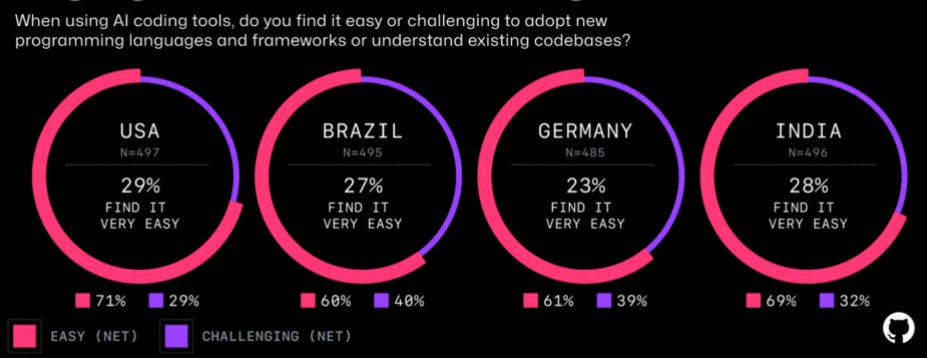| GitHub Reveals Regional Variation In AI Usage |
| Written by Sue Gee |
| Wednesday, 21 August 2024 |
|
Almost all software developers in a survey covering the USA, India, Brazil and Germany have used AI tools, but company support varies by region. While the US companies shows strong support, with 88% of respondents indicating at least some company backing, in Germany only 59% of respondents report similar support. This is the 2nd survey conducted by Wakefield Research on behalf of GitHub investigating the impact of AI on professional developers. The inaugural survey was of 500 devs, all in the USA, of whom 92% said they had using AI coding tools. This new survey had 2,000 participants, 500 each from the USA, Brazil, Germany, and India, working at companies with 1000+ employees. While software engineers, developers, and programmers made up the majority of respondents, a small number of data scientists and software designers were also included to get a fuller and more diverse view of AI’s impact. Over 97% of respondents have used AI coding tools either at home or work. Usage is highest in the USA and Brazil but in these two regions only a small proportion (17%) had used AI coding tools outside work, whereas in Germany the proportion of rose to 27%. Germany was the country with the lowest level of company support for AI coding tools. Respondents were asked to select from four options to describe their company's approach:
Whereas in India 40% of respondents selected the "Actively encouraging" option, in Germany this fell to 30%. Combining this with "Allowing their use" the USA came top (88%), with India next (79%), then Brazil (76%) with Germany lagging well behind at 59%, with 27% choosing the "Neither encouraging nor limiting" response and 14% selecting the "Discouraging" option. According to Kyle Daigle on the GitHub blog: Nearly half (48%) of respondents working in organizations that actively promote AI tools reported their toolchains were “simple” to use. In contrast, a significantly higher proportion (65%) of respondents from organizations with a neutral stance on AI use described their toolchains as complex. This suggests AI coding tools may play a role in streamlining workflows and reducing toolchain complexity for software development teams. Building on previous GitHub research that, as we reported at the time, revealed that use of Copilot improved developer productivity by 55%, this survey probed into the ways AI tools helped respondents. In general the findings confirmed that AI helps them work more productively, allowing them to focus on designing systems, collaborating more effectively, and better meeting customer requirements. One specific finding was that 70% of all respondents said that tools make it "easy" to adopt a new programming language or understand an existing codebase. There was regional variation with only 23% of those in Germany finding that AI coding tools made these tasks very easy whereas 39% still found them challenging, compared to 29% of the USA being at the two extremes Asked about how the use of AI tools affected code quality, 90% of respondents in the USA and 81% of those in India reported a perceived increase in code quality when using AI coding tools. In comparison, only 61% of respondents in Brazil and 60% in Germany saw an increase in code quality while a decrease was perceived by 19% and 15% in Brazil and Germany respectively. Nearly all respondents believe that proficiency in AI coding tools is skill worth having for job seekers in that it makes them more attractive candidates. In India 56% of respondents and 43% in Germany believe this expertise significantly boosts their employability.
More InformationAI In Software Development Survey 2024 Related ArticlesGitHub Copilot Provides Productivity Boost Developers Wary Of The AI Tools They Use Developers Like Code Assistants Even When They Are Incorrect GitHub Sees Exponential Rise In AI GitHub Announces AI-Powered Changes To be informed about new articles on I Programmer, sign up for our weekly newsletter, subscribe to the RSS feed and follow us on Twitter, Facebook or Linkedin.
Comments
or email your comment to: comments@i-programmer.info |
| Last Updated ( Wednesday, 21 August 2024 ) |




